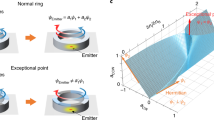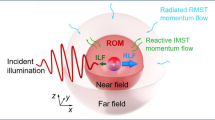Abstract
THE experiments of Wood and Ellett1 on the polarisation of the resonant radiation of mercury suggest that it is necessary to make a rather important modification in the quantum theory. The theory of the phenomenon has been examined by several writers,2 among whom Eldridge has most explicitly directed attention to a case of difficulty. He shows that the observations in a magnetic field are a natural consequence of regarding magnetism as equivalent to rotation, provided that the effect without field is given, but that this effect without field conforms rather to the classical than to the quantum theory.
This is a preview of subscription content, access via your institution
Access options
Subscribe to this journal
Receive 51 print issues and online access
$199.00 per year
only $3.90 per issue
Buy this article
- Purchase on Springer Link
- Instant access to full article PDF
Prices may be subject to local taxes which are calculated during checkout
Similar content being viewed by others
References
Wood and Ellett, Proc. Roy. Soc. A, ciii. p. 396, 1923.
Breit, Phil. Mag., xlii. p. 832, 1924; Gaviola and Pringsheim, Ztschr. f. Pkys., xxv. p. 367, 1924; Eldridge, Phys. Rev., xxiv. p. 234, 1924, and others.
Ellett, NATURE, December 27, 1924, vol. 114, p. 931.
Author information
Authors and Affiliations
Rights and permissions
About this article
Cite this article
DARWIN, C. Resonance Radiation and the Correspondence Principle. Nature 115, 81–82 (1925). https://doi.org/10.1038/115081a0
Issue Date:
DOI: https://doi.org/10.1038/115081a0
Comments
By submitting a comment you agree to abide by our Terms and Community Guidelines. If you find something abusive or that does not comply with our terms or guidelines please flag it as inappropriate.



